Key takeaways:
- Choosing a crypto trading platform involves assessing fees, security features, and customer support, which greatly influence the trading experience.
- Common crypto scams include unrealistic return promises, phishing attempts, and misleading social media advice, requiring vigilance and thorough research.
- Signs of a legitimate platform include transparency, robust customer support, and positive user reviews, which help build trust.
- Practicing safe trading involves using secure wallets, enabling two-factor authentication, and staying informed about potential scams and industry updates.

Understanding Crypto Trading Platforms
Understanding crypto trading platforms requires recognizing their fundamental role in the digital currency ecosystem. I remember the first time I navigated one of these platforms; the interface seemed overwhelming. It’s easy to feel lost in terms and features, but finding a user-friendly platform can significantly enhance your trading experience.
These platforms serve as intermediaries that facilitate buying, selling, and exchanging cryptocurrencies. Did you ever wonder how transactions happen almost instantly? It’s fascinating how technology supports these processes, making crypto accessible to anyone with an internet connection. Personally, I find it reassuring to know that reputable platforms employ advanced security measures, although I still stay vigilant since the landscape can be unpredictable.
When choosing a platform, consider factors like fees, security, and customer support. Each of these elements can greatly impact your trading journey. I once overlooked high withdrawal fees thinking they were trivial, only to realize later how much they cut into my profits. Trust me, being informed about these details makes all the difference in navigating the crypto space confidently.
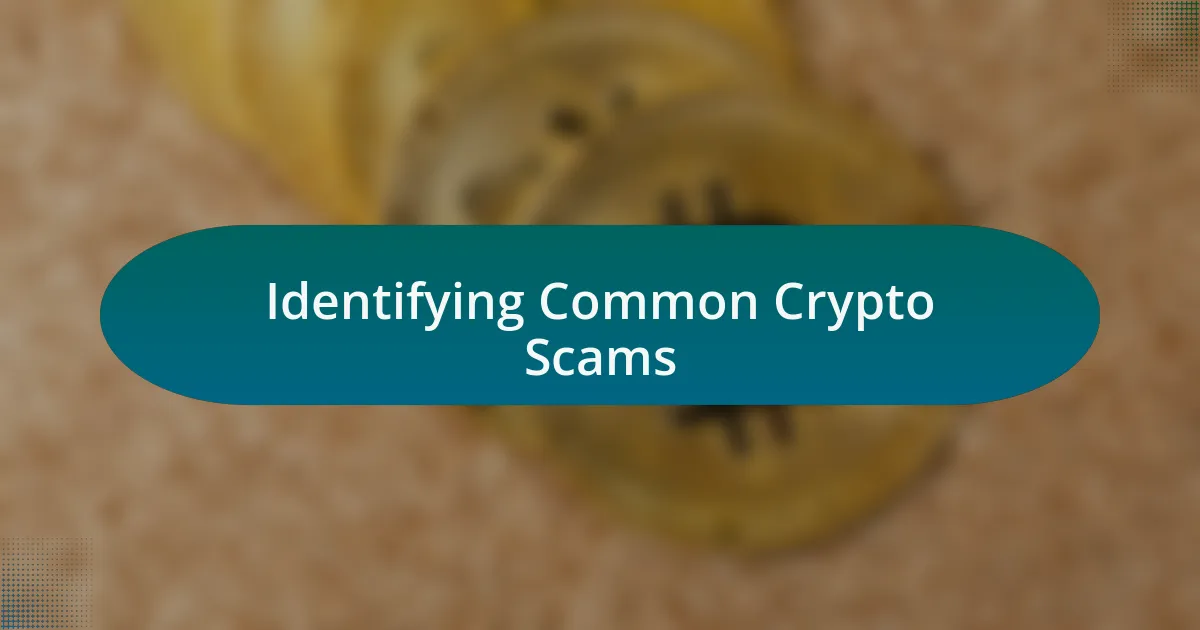
Identifying Common Crypto Scams
When it comes to identifying common crypto scams, one pattern stands out: unrealistic promises of returns. I recall an instance where a friend was lured into a scheme that guaranteed a 200% return within a week. It seemed too good to be true, and, inevitably, it was. If an investment opportunity feels excessively rewarding without any risk, it’s crucial to raise a red flag.
Another frequent scam involves fake exchanges or wallets that mimic legitimate platforms. I fell victim to a phishing attempt once, where I received a message that looked official, asking me to verify my account. Instead, it led to a fraudulent site designed to steal my credentials. Always double-check URLs and ensure you’re using the official website; it’s a small step that can safeguard your assets.
Lastly, social media and forums are breeding grounds for scams, often masked as investment advice or insider tips. I often ask myself why someone would share a “hot tip” for free, and my experience tells me it’s usually for personal gain rather than the community’s benefit. Engaging with these posts can be tempting, but it’s essential to approach them with skepticism and conduct your own research before taking action.
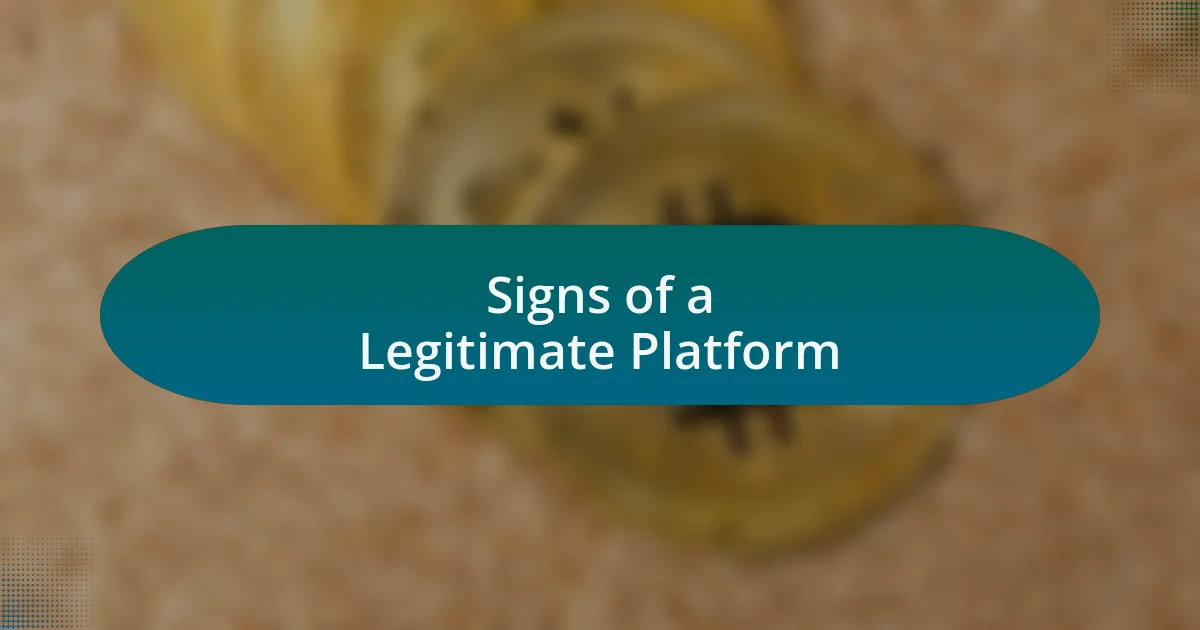
Signs of a Legitimate Platform
When I evaluate a cryptocurrency platform, the first thing I look for is transparency. Legitimate exchanges typically provide clear information about their team, location, and regulatory compliance. I remember feeling a sense of relief when I found a platform that proudly showcased its licenses and the identities of its founders. It not only built trust but also reassured me that I was making a safe choice in a world that can often feel like a wild west.
Another key indicator of a legitimate platform is their customer support. A robust and accessible support system can make a significant difference, especially in the often chaotic realm of crypto. There was a time when I had a withdrawal issue, and the quick responses I received from a well-established platform’s support team gave me immense peace of mind. If I can’t easily contact someone for help, I can’t help but wonder what happens if an issue arises—am I just left to figure it out on my own?
Lastly, I pay attention to user reviews and community feedback. Authentic platforms tend to have a following that appreciates their services and shares genuine experiences. I took a deep dive into online forums before choosing my last trading platform, and the positive testimonials from users just like me influenced my decision immensely. If the general consensus leans towards skepticism or outright criticism, I can’t shake the feeling that it’s a sign to steer clear.
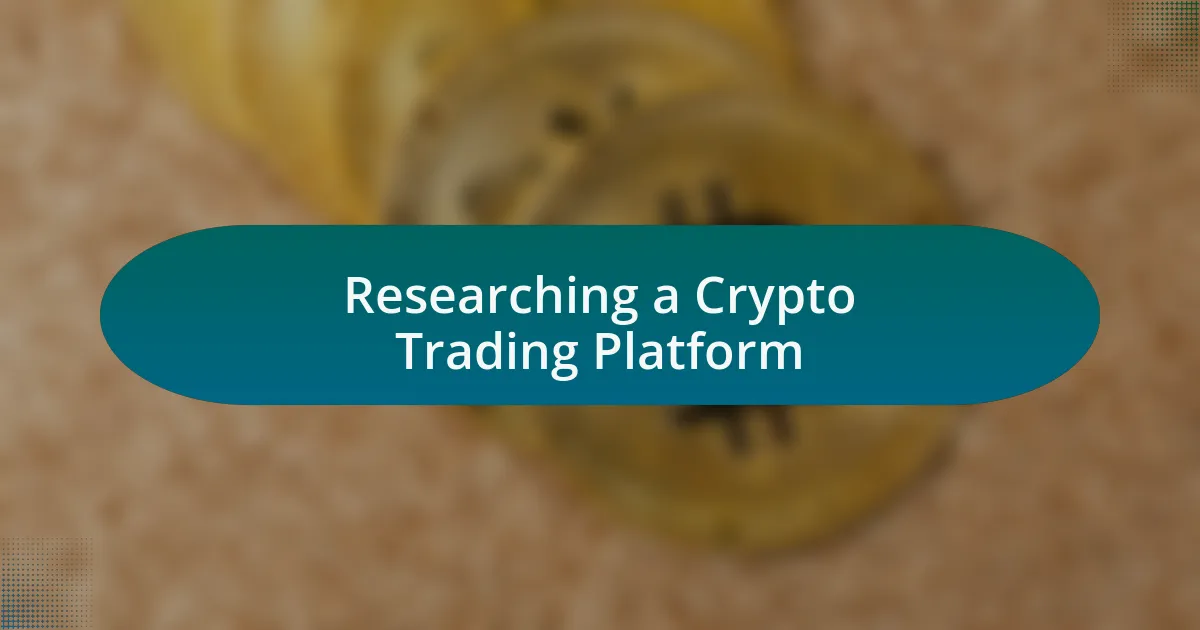
Researching a Crypto Trading Platform
When researching a crypto trading platform, I always start with the platform’s security features. I remember the first time I came across an exchange boasting bank-level security measures, and it instantly captured my attention. I couldn’t help but think, how would I feel if my funds were at risk? Ensuring that the platform employs strong encryption and two-factor authentication felt like a fundamental first step in safeguarding my investments.
Another critical aspect I explore is the fee structure. I once overlooked this detail and ended up surprised by hidden costs that chipped away at my profits. It’s essential to read the fine print and compare fees across different platforms. Do I want to gamble with my hard-earned money because I didn’t fully understand the charges? Knowing how much I’ll pay to trade helps me better strategize my investments.
Lastly, I consider the range of cryptocurrencies offered. I’ll never forget the excitement I felt when I discovered a platform that supported both well-known coins and emerging altcoins. It made me think about the potential opportunities I could miss if I limited my choices. How can I diversify my portfolio effectively if the platform doesn’t provide access to a variety of assets? Having a broad selection empowers me to make informed decisions and explore the crypto space more thoroughly.
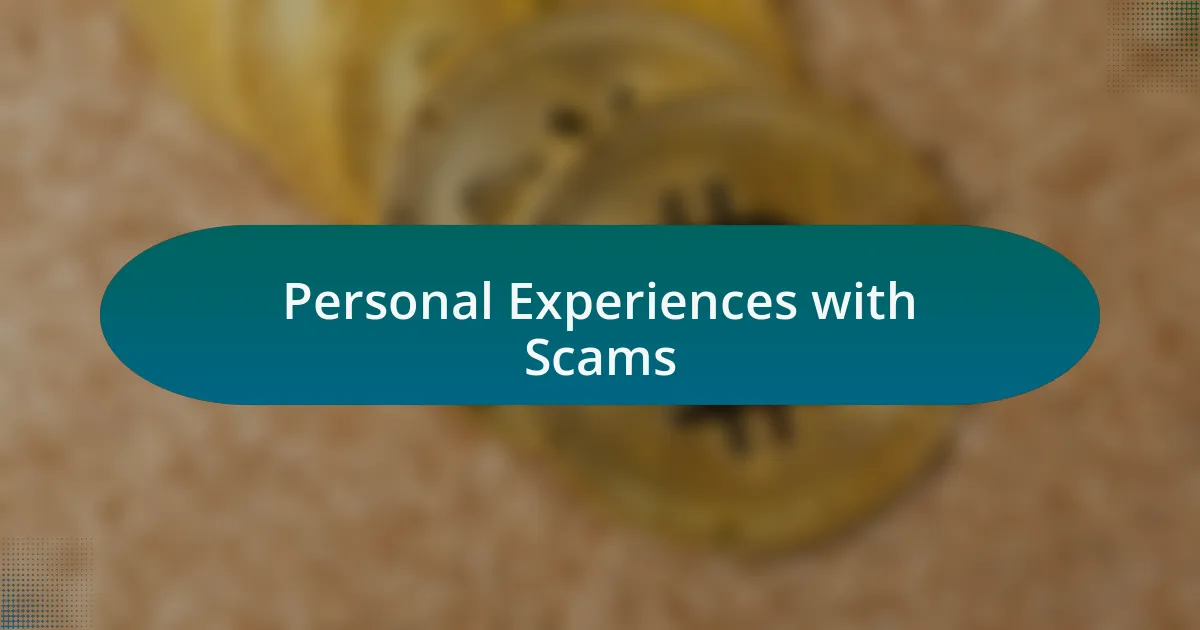
Personal Experiences with Scams
I vividly recall my first encounter with a phishing email that looked alarmingly real. It claimed to be from a well-known exchange—complete with a professional layout and official logos. I almost clicked the link, but something told me to hesitate. That gut feeling saved me from potentially losing my funds, teaching me to scrutinize every communication closely.
In another instance, I was lured into a Ponzi-like scheme by promises of outrageous returns. The initial thrill of watching my investment grow evaporated when I tried to withdraw funds and found it impossible. That experience made me acutely aware of the red flags, like promises that seemed too good to be true. I learned the hard way that if it sounds unrealistic, it likely is.
There was also a time when I engaged with a so-called investment guru on social media, who professed to have insider knowledge. I felt a rush of excitement as I followed their tips, but soon realized they were merely recycling information that anyone could find with a quick Google search. That experience highlighted the importance of due diligence and trusting my judgment rather than falling for charismatic influencers promising the moon. How often do we let excitement cloud our critical thinking?
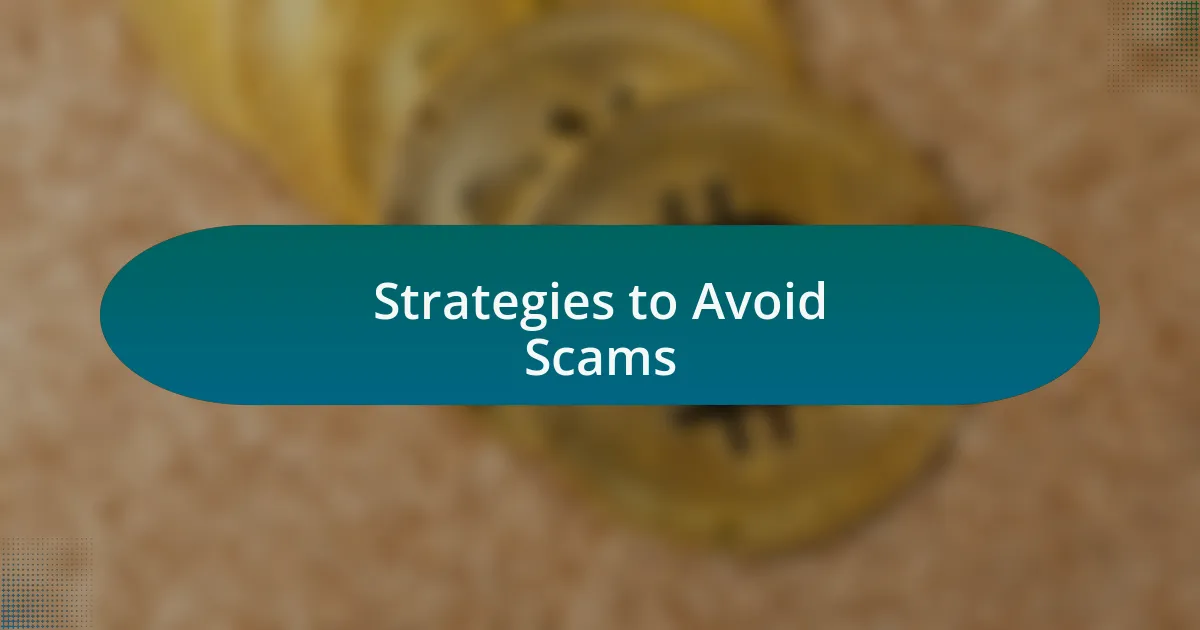
Strategies to Avoid Scams
When it comes to avoiding scams, one of my best strategies is to always verify the source before acting on any information. I remember a time when a friend insisted I invest in a new altcoin because he read about it on a blog. I took a moment to research the project and discovered it had no credible team behind it. That experience underscored the importance of sticking to reputable sites and diving deeper into any claims before parting with my hard-earned money. Don’t you think taking that extra step could save a lot of heartache?
I also make it a practice to use two-factor authentication (2FA) across all my accounts. There was one occasion when I nearly lost access to one of my wallets because I didn’t have 2FA enabled. Knowing that my account had an additional layer of security gave me peace of mind. It’s a simple step that can greatly reduce the likelihood of unauthorized access. Wouldn’t it be reassuring to know your investments are more secure just by taking a little extra precaution?
Another effective strategy I’ve adopted is to engage with community forums and discussions. I’ve found immense value in platforms like Reddit, where users openly share their experiences and warn against potential scams. Once, a user posted about a project that I was considering, highlighting several red flags. Their insights not only saved me from a poor investment but also reminded me that collective knowledge is powerful. Have you ever thought about how a community can serve as a watchdog?
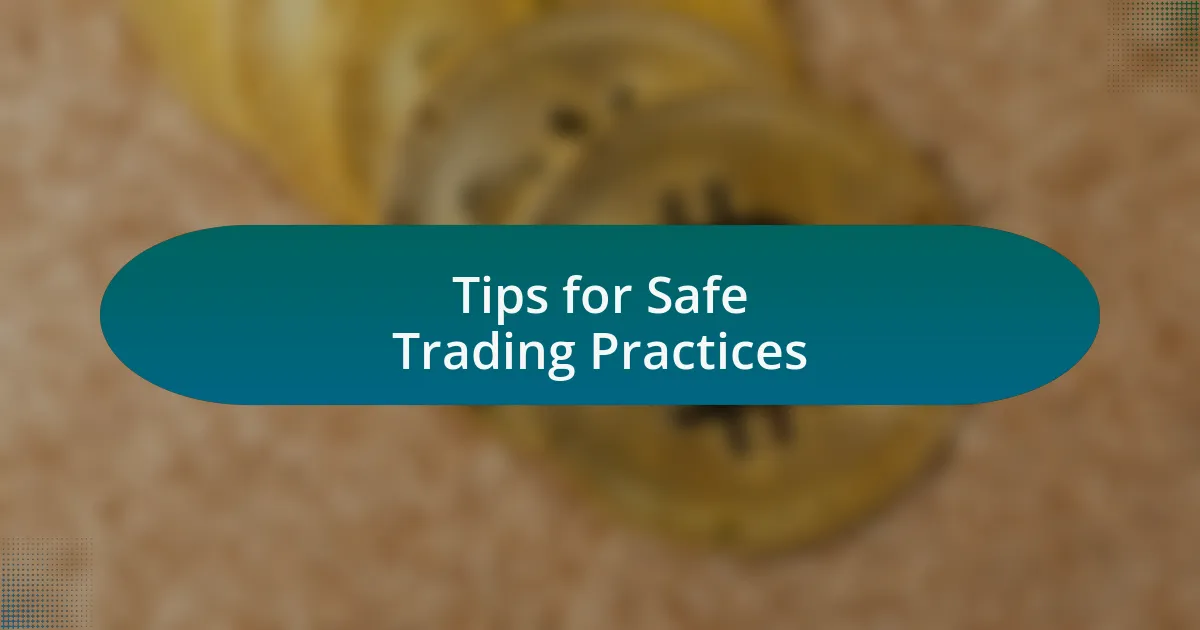
Tips for Safe Trading Practices
When it comes to safe trading practices, I always prioritize using secure wallets for my cryptocurrencies. There was a time when I felt tempted to keep my assets on an exchange for easy access, thinking it was a hassle to transfer them to a wallet. However, I learned the hard way when a friend of mine lost a substantial amount due to an exchange hack. That incident was an eye-opener and solidified my commitment to keeping my assets in cold storage whenever possible. Isn’t it better to take proactive measures than to deal with the regret of a preventable loss?
Additionally, I make it a point to regularly update my passwords and use complex combinations that include numbers, symbols, and upper and lower-case letters. A few months back, I heard about someone getting their account compromised due to a weak password. It’s an unsettling thought that such a simple action could lead to devastating consequences. I now maintain a dedicated password manager, which helps me keep track of unique passwords without the fear of forgetting them. Can you imagine the relief of knowing your accounts are protected by robust passwords?
Moreover, I’ve found that staying informed about the latest scams and industry news significantly contributes to safer trading. I subscribe to reputable newsletters and follow industry leaders on social media to keep my knowledge fresh. Just recently, I read an article detailing a phishing scheme that targeted new investors, which could have easily caught me off guard if I hadn’t been vigilant. This proactive approach not only empowers me but also equips me to educate others about potential risks. Don’t you think being informed is one of the best defenses we have against scams?